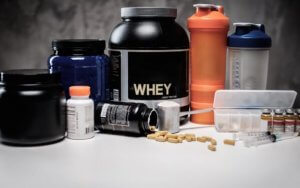Gain Muscle in a Healthy Way With These Protein Supplements

Exercise builds large and strong muscles. However, protein supplements can also help. To gain muscle in a healthy way without any issues, the best choice is to opt for protein supplements that don’t cause any damage to the body.
Proteins are basically amino acid molecules that nourish the body. We must ingest them through food since our body doesn’t produce them by itself. They are found in meats of animal origin and vegetables such as broccoli, spinach, and avocado. This is an essential nutrient for the muscle fibers, ligaments, tendons, and organs.
Athletes consider protein a very precious element to keep their body in good condition for exercise. Moreover, it’s a great ally to gain muscle. Over time, supplements and protein powders were developed to promote the growth of muscle mass. However, some of them have detrimental effects on health. For this reason, we will give you more options to gain muscle in a healthy way. Keep reading!
Protein supplement
Now, a protein supplement for the sports world and fitness is like a complement to the protein that you already consume daily in your meals. This means that you usually ingest supplements at strategic times that benefit the training of the day or week.

There is a large variety of protein supplements: creatine, caseinate, glutamine, and others. It’s not a problem if you decide to try any protein supplement. However, in the long term, it’s best to choose those that are healthy and effective at the same time. With this in mind, we’ll share the best alternatives for increasing your muscle mass!
Natural proteins
The first option to increase muscle is to consume natural proteins. That is, the ones we find in unprocessed foods. The advantage of this is that you can ingest it in different ways, unlike protein powder, which you can only take in liquids. Furthermore, foods rich in proteins often contain other nutrients such as iron, fiber, and several vitamins.
Among high protein foods, you can find the following:
- Avocado.
- Broccoli.
- Spinach.
- Eggs.
- Almonds.
- Chia seeds.
- Tuna.
- Cheese.
- Yogurt.
These are some of the most convenient foods for athletes. Additionally, you can easily eat them before exercising and also vary the way you consume them. For example, one day you can have chia, yogurt, and fruits in a smoothie, and the next day, you can make a snack with avocado and tuna. You are free to combine the foods as you like!
Vitamin supplements
You can find vitamin supplements in any pharmacy. They are usually loaded with many different vitamins. So, choose one that has several nutrients, including protein. This is one of the most practical alternatives since it’s only a matter of ingesting a pill each day and that’s it. They even benefit by balancing the other vitamins that we sometimes can’t consume in food and also provide the energy needed to train.
Essential fatty acids
Essential fatty acids are necessary for the body to fulfill and synthesize its basic functions. They are also sources of energy and some of them provide benefits for the cardiovascular and nervous system too. There are several essential fatty acids that are included in our diets, nonetheless, these are a few of the relevant ones:
- Omega-3: it improves heart health and helps balance blood sugar levels. Moreover, it contains eicosapentaenoic acid, which reduces inflammation after exercise and helps maintain and strengthen muscles in a healthy way.
- Omega-6: this fatty acid increases fat burning, reduces cholesterol, and reinforces the immune system. It also helps develop the muscular membrane and elevates growth hormone segregation.
We can obtain omega-3 and omega-6 in pill presentations or in supplements such as fish oil. They are also available in foods such as nuts, fish, sunflower seeds, and others. Consuming omega-3 and omega-6 will also aid brain performance, so you will have better concentration and coordination to exercise.
Creatine
Creatine is a very effective supplement that doesn’t cause negative repercussions. It’s a chemical that the body produces through amino acids and basically gives the muscles energy to work. The use of creatine is wonderful because it also increases strength and delays the production of lactic acid; this means you can train more and with less pain.

There are different ways to increase the creatine in your system, either through foods such as meat, fish, milk, or you can consume your own version in powder form and use it to make smoothies. If you decide to consume creatine powder, it’s crucial to make sure it doesn’t contain other types of supplements that can damage your body.
Eating healthy protein supplements in addition to exercise ensures muscle growth without any problems. So don’t wait any longer, choose the option that best suits you and start growing your muscles!
Exercise builds large and strong muscles. However, protein supplements can also help. To gain muscle in a healthy way without any issues, the best choice is to opt for protein supplements that don’t cause any damage to the body.
Proteins are basically amino acid molecules that nourish the body. We must ingest them through food since our body doesn’t produce them by itself. They are found in meats of animal origin and vegetables such as broccoli, spinach, and avocado. This is an essential nutrient for the muscle fibers, ligaments, tendons, and organs.
Athletes consider protein a very precious element to keep their body in good condition for exercise. Moreover, it’s a great ally to gain muscle. Over time, supplements and protein powders were developed to promote the growth of muscle mass. However, some of them have detrimental effects on health. For this reason, we will give you more options to gain muscle in a healthy way. Keep reading!
Protein supplement
Now, a protein supplement for the sports world and fitness is like a complement to the protein that you already consume daily in your meals. This means that you usually ingest supplements at strategic times that benefit the training of the day or week.

There is a large variety of protein supplements: creatine, caseinate, glutamine, and others. It’s not a problem if you decide to try any protein supplement. However, in the long term, it’s best to choose those that are healthy and effective at the same time. With this in mind, we’ll share the best alternatives for increasing your muscle mass!
Natural proteins
The first option to increase muscle is to consume natural proteins. That is, the ones we find in unprocessed foods. The advantage of this is that you can ingest it in different ways, unlike protein powder, which you can only take in liquids. Furthermore, foods rich in proteins often contain other nutrients such as iron, fiber, and several vitamins.
Among high protein foods, you can find the following:
- Avocado.
- Broccoli.
- Spinach.
- Eggs.
- Almonds.
- Chia seeds.
- Tuna.
- Cheese.
- Yogurt.
These are some of the most convenient foods for athletes. Additionally, you can easily eat them before exercising and also vary the way you consume them. For example, one day you can have chia, yogurt, and fruits in a smoothie, and the next day, you can make a snack with avocado and tuna. You are free to combine the foods as you like!
Vitamin supplements
You can find vitamin supplements in any pharmacy. They are usually loaded with many different vitamins. So, choose one that has several nutrients, including protein. This is one of the most practical alternatives since it’s only a matter of ingesting a pill each day and that’s it. They even benefit by balancing the other vitamins that we sometimes can’t consume in food and also provide the energy needed to train.
Essential fatty acids
Essential fatty acids are necessary for the body to fulfill and synthesize its basic functions. They are also sources of energy and some of them provide benefits for the cardiovascular and nervous system too. There are several essential fatty acids that are included in our diets, nonetheless, these are a few of the relevant ones:
- Omega-3: it improves heart health and helps balance blood sugar levels. Moreover, it contains eicosapentaenoic acid, which reduces inflammation after exercise and helps maintain and strengthen muscles in a healthy way.
- Omega-6: this fatty acid increases fat burning, reduces cholesterol, and reinforces the immune system. It also helps develop the muscular membrane and elevates growth hormone segregation.
We can obtain omega-3 and omega-6 in pill presentations or in supplements such as fish oil. They are also available in foods such as nuts, fish, sunflower seeds, and others. Consuming omega-3 and omega-6 will also aid brain performance, so you will have better concentration and coordination to exercise.
Creatine
Creatine is a very effective supplement that doesn’t cause negative repercussions. It’s a chemical that the body produces through amino acids and basically gives the muscles energy to work. The use of creatine is wonderful because it also increases strength and delays the production of lactic acid; this means you can train more and with less pain.

There are different ways to increase the creatine in your system, either through foods such as meat, fish, milk, or you can consume your own version in powder form and use it to make smoothies. If you decide to consume creatine powder, it’s crucial to make sure it doesn’t contain other types of supplements that can damage your body.
Eating healthy protein supplements in addition to exercise ensures muscle growth without any problems. So don’t wait any longer, choose the option that best suits you and start growing your muscles!
All cited sources were thoroughly reviewed by our team to ensure their quality, reliability, currency, and validity. The bibliography of this article was considered reliable and of academic or scientific accuracy.
- Weiss, C. A., & Powers, M. E. (2006). Creatine supplementation does not impair the thermoregulatory response during a bout of exercise in the heat. Journal of Sports Medicine and Physical Fitness, 46(4), 555–563.
- Phillips, S. M., & van Loon, L. J. C. (2011). Dietary protein for athletes: From requirements to optimum adaptation. Journal of Sports Sciences, 29(SUPPL. 1). https://doi.org/10.1080/02640414.2011.619204
- Atherton, P. J., & Smith, K. (2012, February). Muscle protein synthesis in response to nutrition and exercise. Journal of Physiology. https://doi.org/10.1113/jphysiol.2011.225003
- Listrat, A., Lebret, B., Louveau, I., Astruc, T., Bonnet, M., Lefaucheur, L., … Bugeon, J. (2016). How muscle structure and composition influence meat and flesh quality. Scientific World Journal. Hindawi Limited. https://doi.org/10.1155/2016/3182746
- Simopoulos, A. P. (2002, October). The importance of the ratio of omega-6/omega-3 essential fatty acids. Biomedicine and Pharmacotherapy. https://doi.org/10.1016/S0753-3322(02)00253-6
- Jeromson, S., Gallagher, I. J., Galloway, S. D. R., & Hamilton, D. L. (2015, November 1). Omega-3 fatty acids and skeletal muscle health. Marine Drugs. MDPI AG. https://doi.org/10.3390/md13116977
This text is provided for informational purposes only and does not replace consultation with a professional. If in doubt, consult your specialist.








